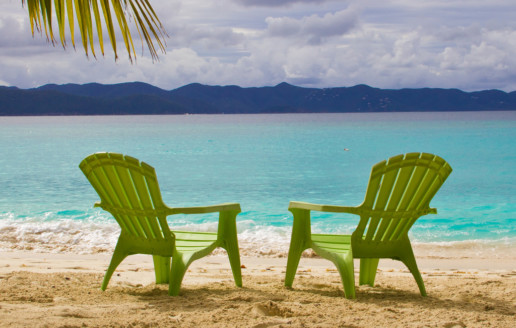How employees really feel about asking for time off during the holidays
A new study reveals that 51 percent of employees feel uneasy about asking to use their vacation days during the holidays. Continue reading this blog post to learn more.
Are employers checking their PTO list? They may want to check it twice, according to new data, workers may be leaving vacation days on the table during the holidays because they feel uncomfortable asking for time off.
More than half of employees (51%) feel uneasy about asking to use their paid time off during the holidays, according to a new survey of more than 2,000 employees from management and technology consulting firm, West Monroe Partners. This discomfort was even more prevalent in smaller companies with smaller staffs, where employees work more closely with their managers and colleagues.
Michael Hughes, managing director at West Monroe Partners, says part of the reason employees are so nervous about asking for time off is the expectation that they have to be available 24/7. An employee may also be concerned they will appear to be slacking if aren’t in the office with many companies being short staffed to begin with, he says.

“With the war for talent, people are being asked to do more and more because either they’re shorthanded or can’t find people,” Hughes says.
Nearly two-thirds of employees working in the banking sector felt uncomfortable asking to use their PTO, according to the survey. Although Monroe Partners did not specifically review why this might be the case for banking, Hughes says he thinks that, like other service industries, bank employees often have to work during the holidays to attend to customers.
Banks were hit hard during the 2007 economic recession, he adds, and some have been cautious about beefing their workforce — forcing current employees to carry heavy workloads. But, he adds, this is fairly common across many industries.
“I think it’s something that impacts industries across the board,” he says. “[But] just based on the study banking is one that sticks out.”
West Monroe Partners recommends companies close the office on days other than just federal holidays and accommodate for remote working or flexible scheduling.
Training managers to fairly process PTO requests may also be necessary, the report notes. Managers can do a better job of having open conversations with employees around PTO and job satisfaction.
Despite worker’s anxieties, employers should communicate the importance of taking time off during the holidays, Hughes says. It’s good for workers to get time to rest, he adds. If employees are unhappy in the office, it will likely trickle down to the customer experience.
“A lot of it is just personal health,” he says. “If you give people the opportunity to recharge, they’re going to be more productive when they’re happy.”
SOURCE: Hroncich, C. (7 December 2018) "How employees really feel about asking for time off during the holidays" (Web Blog Post). Retrieved from https://www.benefitnews.com/news/how-employees-really-feel-about-asking-for-time-off-during-the-holidays?brief=00000152-14a7-d1cc-a5fa-7cffccf00000
How to get the most out of a day off
Time off is necessary but planning an extended vacation may be stressful. These pointers will help show you how micro-vacations can positively benefit your lifestyle.
The idea of “vacation” often conjures up thoughts of trips to faraway lands. While it’s true that big trips can be fun and even refreshing, they can also take a lot of time, energy, and money. A lot of people feel exhausted just thinking about planning a vacation—not just navigating personal commitments and school breaks, but deciding how to delegate major projects or put work on hold, just so they can have a stress-free holiday. Because of this, some might put off their time away, figuring they’ll get to it when their schedule isn’t so demanding, only to discover at the end of the year that they haven’t used up their paid time off.
In my experience as a time management coach and as a business owner, I’ve found that vacations don’t have to be big to be significant to your health and happiness. In fact, I’ve been experimenting with the idea of taking “micro-vacations” on a frequent basis, usually every other week. These small bits of time off can increase my sense of happiness and the feeling of having “room to breathe.”
From my point of view, micro-vacations are times off that require you to use a day or less of vacation time. Because of their shorter duration, they typically require less effort to plan. And micro-vacations usually don’t require you to coordinate others taking care of your work while you’re gone. Because of these benefits, micro-vacations can happen more frequently throughout the year, which allows you to recharge before you’re feeling burnt out.
If you’re feeling like you need a break from the day-to-day but can’t find the time for an extended vacation, here are four ways to add micro-vacations to your life.
Weekend trips.Instead of limiting vacations to week-long adventures, consider a two- to three-day trip to someplace local. I’m blessed to live in Michigan, and one of my favorite weekend trips is to drive to Lake Michigan for some time in a little rented cottage on the shore or to drive up north to a state park. Especially if you live in an urban area, traveling even a few hours can make you feel like you’re in a different world.
To make the trip as refreshing as possible, consider taking time off on Friday so you can wrap up packing, get to your destination, and do a few things before calling it a night. That still leaves you with two days to explore the area. If you get home by dinnertime on Sunday, you can unpack and get the house in order before your workweek starts again.
There may be a few more e-mails than normal to process on Monday, but other than that, your micro-vacation shouldn’t create any big work pileups.
Margin for personal to-do items.Sometimes getting the smallest things done can make you feel fantastic. Consider taking an afternoon—or even a full day—to take an unrushed approach to all of the nonwork tasks that you really want to do but struggle to find time to do. For example, think of those appointments like getting your hair cut, nails done, oil changed, or doctor visits. You know that you should get these taken care of but finding the time is difficult with your normal schedule.
Or perhaps you want to take the time to do items that you never seem to get to, like picking out patio furniture, unpacking the remaining boxes in the guest room, or setting up your retirement account. You technically could get these kinds of items done on a weeknight or over the weekend. But if you’re consistently finding that you’re not and you have the vacation time, use it to lift some of the weight from the nagging undone items list.
Shorter days for socialization.As individuals get older and particularly after they get married, there tends to be a reduction in how much time they spend with friends. One way to find time for friends without feeling like you’re sacrificing your family time is to take an hour or two off in a day to meet a friend for lunch or to get together with friends before heading home. If you’re allowed to split up your vacation time in these small increments, a single vacation day could easily give you four opportunities to connect with friends who you otherwise might not see at all.
If you struggle to have an uninterrupted conversation with your spouse because your kids are always around, a similar strategy can be helpful. Find days when one or both of you can take a little time off to be together. An extra hour or two will barely make a difference at work but could make a massive impact on the quality of your relationship.
Remote days for decompression. Many offices offer remote working options for some or all of the week. If that’s offered and working remotely is conducive to your work style and your tasks, take advantage of that option.
Working remotely is not technically a micro-vacation, but it can often feel like one. (Please still do your work—I don’t want to get in trouble here!) If you have a commute of an hour or more each way, not having to commute can add back in two or more hours to your life that can be used for those personal tasks or social times mentioned above.
Also, for individuals who work in offices that are loud, lack windows, or where drive-by meetings are common, working remotely can feel like a welcome respite. Plus, you’re likely to get more done. A picturesque location can also give you a new sense of calm as you approach stressful projects. I find that if I’m working in a beautiful setting, like by a lake, it almost feels as good as a vacation. My surroundings have a massive impact on how I feel.
Instead of seeing “vacation” as a large event once or twice a year, consider integrating in micro-vacations into your life on a regular basis. By giving yourself permission to take time for yourself, you can increase your sense of ease with your time.
SOURCE:
Saunders E (28 May 2018). [Web Blog Post]. Retrieved from address https://hbr.org/2018/05/how-to-get-the-most-out-of-a-day-off
10 surprisingly great places to retire in the U.S.
At Saxon, we care about retirement and offering you the best plans. In this article, we take a look at Forbes's list of the top 10 places to retire. Do any of these places sound peaceful to you?
Probably the biggest retirement decision you’ll face (after: Can I ever?) is: Where should I retire? To help, U.S. News has just come out with its first Best Places to Retire in the United States ranking of the 100 largest metropolitan areas. Some of its Top 10 spots will surely surprise you and you may also wonder why certain parts of the country failed to make the cut.

Credit: Shutterstock
“This is a much more comprehensive analysis than we’ve done in the past,” said Emily Brandon, U.S. News senior editor for retirement. “Before, we’ve done themed lists like 10 Places to Retire on Social Security Alone and 10 Retirement Spots With Year-Round Nice Weather.”
How U.S. News Ranked the Best Places to Retire
This time, U.S. News first asked people 45 and older to indicate the “attributes of a retirement destination that are most important to them” and collected responses from 841 of them. “What people told us was most important to them in a place to retire was 'being affordable' but also, they wanted to feel happy there,” said Brandon.
The Top 10
The Top 10 best places to retire in America, according to U.S. News:
- Sarasota, Fla.
- Lancaster, Pa.
- San Antonio, Texas
- Grand Rapids, Mich.
- El Paso, Texas
- McAllen, Texas
- Daytona Beach, Fla.
- Pittsburgh, Pa.
- Austin, Texas
- Washington, D.C.
“Most of the places scored well on some measures, but not on others,” said Brandon.
That’s a fact. Sarasota had high scores for Happiness, Desirability and Retiree Taxes and decent ones in the other categories. McAllen didn’t fare well in the Job Market category and Washington, D.C. got a low ranking for Housing Affordability. El Paso and Grand Rapids were weak in the Desirability category.
Why Places Scored Well and Didn't
The reason four Texas metro areas made it into the Top 10? “Affordable housing, low taxes and above-average levels of happiness,” said Brandon.
The three winners in the Middle Atlantic states (Lancaster, Pittsburgh and Washington, D.C.) had high rankings because of happy residents and access to high quality health care, Brandon noted.
You may have noticed that the Top 10 largely consists of small- and mid-size cities and no California or New York City-area metros. “I think a lot of that has to do with housing prices,” said Brandon. “Almost no California places scored high in the list largely because housing prices are out of reach for many people with low- or even mid-range incomes.” California home prices are 150% above the U..S. average, overall. The highest-ranked California metro area in the U.S. News list is San Diego, which came in at No. 21.
What About the Weather?
Somewhat strangely, the U.S. News ranking didn’t factor in weather at all.
“We had some discussion about whether to include weather,” said Brandon. “It’s tricky because not everyone has the same preferences when it comes to weather. Some people want four seasons. Some find snowy winters terrible.” The upshot: the rankers left out this variable.
How the U.S. News List Compares With Other Rankings
The U.S. News list is markedly different from other recent Best Places to Retire rankings from Forbes and WalletHub.
The 25 places Forbes chose, after looking at 550 communities, were in big and small cities and skewed toward warm and moderate climates; its top places included Clemson, S.C., Port Charlotte, Fla. and Green Valley, Ariz. None of its 25 were in the U.S. News Top 10.
WalletHub looked at the retiree-friendliness of the 150 largest U.S. cities across 40 metrics and its top picks were mostly large ones. Three cities in Florida topped the list: Orlando, Tampa and Miami. Austin was the only one in both WalletHub’s Top 10 and U.S. News’.
What the Rankings Can't Rank
You won’t want to move to any place in retirement just because it’s on a Best Places list, of course. And no ranking can account for a key retirement location criteria for many people: proximity to family members.
Still, Best Places to Retire rankings can be a useful part of your research as long as you closely read their methodology, so you understand what the raters were rating.
“These types of surveys can be a great starting point in deciding where to retire,” said Brandon. “It all comes down to your personal preferences. Your criteria for what makes a best place to retire may be different than for others.”
You can read the original article here.
Source:
Eisenberg R. (2 October 2017). "U.S. News Offers A New Take On The Best Places In The U.S. To Retire" [Web blog post]. Retrieved from address https://www.forbes.com/sites/nextavenue/2017/10/02/u-s-news-offers-a-new-take-on-the-best-places-in-the-u-s-to-retire/#4d26f87c60ec
SaveSave



